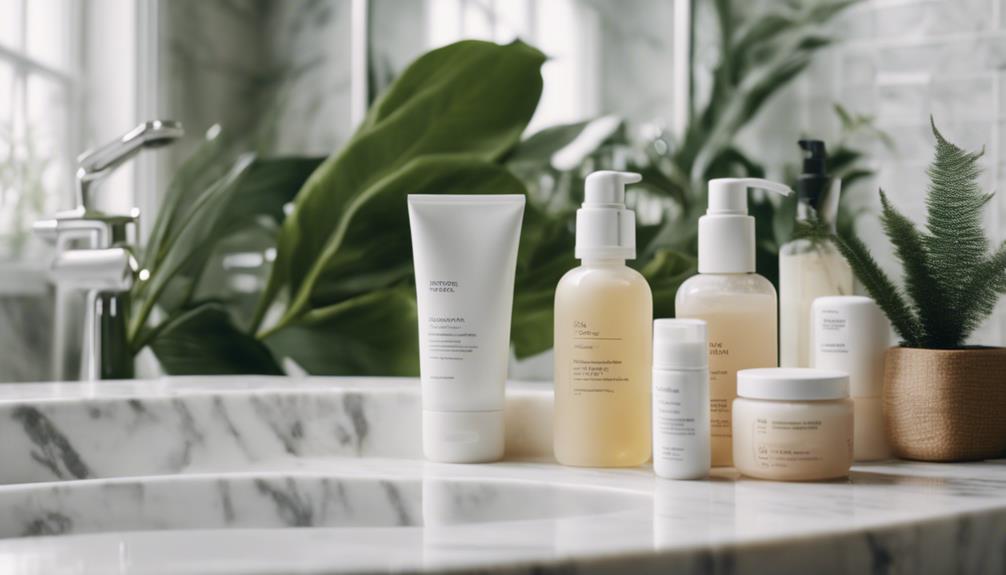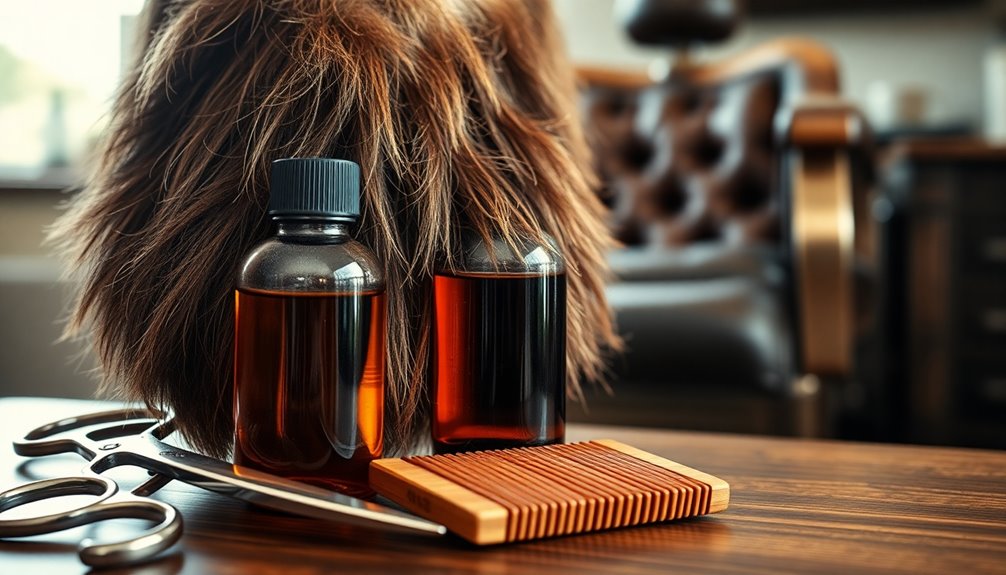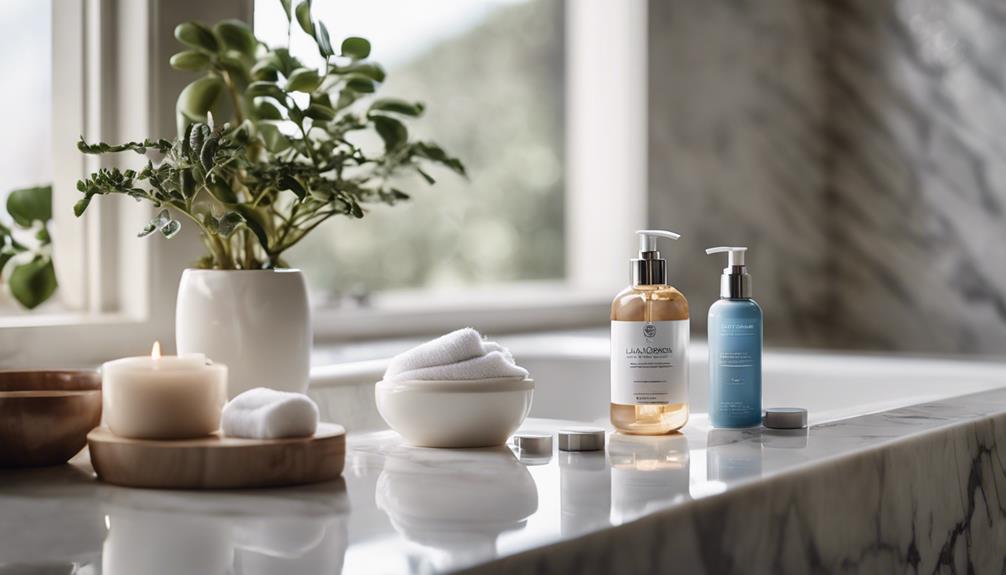To create your perfect skincare regimen, begin by determining your skin type: normal, oily, dry, combination, or sensitive. Then, follow a six-step process: cleanse twice daily to eliminate impurities, exfoliate 1-3 times per week as per your skin’s needs, and use a toner to restore pH balance. Afterwards, apply targeted serums to address specific issues, followed by a moisturizer suitable for your skin type. Lastly, don’t forget sunscreen during the day to shield against UV damage. As you develop this routine, you will learn tricks and techniques to enhance your skincare routine and achieve radiant, healthy skin.
Key Takeaways
- Identify your skin type (normal, oily, dry, combination, sensitive) to tailor your routine effectively.
- Follow a six-step framework: cleanse, exfoliate, tone, treat, moisturize, and apply sunscreen.
- Cleanse twice daily with suitable products for your skin type to remove impurities.
- Exfoliate 1-3 times weekly based on skin type to enhance texture and radiance.
Know Your Skin Type
Understanding your skin type is vital for creating an effective skincare routine that meets your unique needs. There are five primary skin types: normal, oily, dry, combination, and sensitive. Each requires tailored care to keep your skin healthy and vibrant.
To determine your skin type, try a simple bare-faced test. Wash your face, pat it dry, and wait for about 30 minutes. Notice how your skin feels. If you have normal skin, you'll likely experience a balanced sensation without noticeable oiliness or dryness.
Oily skin will show excess shine and enlarged pores, while dry skin often feels tight, flaky, and may look dull. Combination skin displays traits of both oily and dry areas, typically with an oily T-zone and dry cheeks. Finally, sensitive skin may react with redness and irritation, making it important to choose gentle formulations and avoid irritants.
Knowing your specific skin type allows you to select products that cater to your skin's needs, ensuring you provide the right care. Tailored care is key, so take the time to identify your skin type and pave the way for a successful skincare routine.
The Skincare Routine Framework
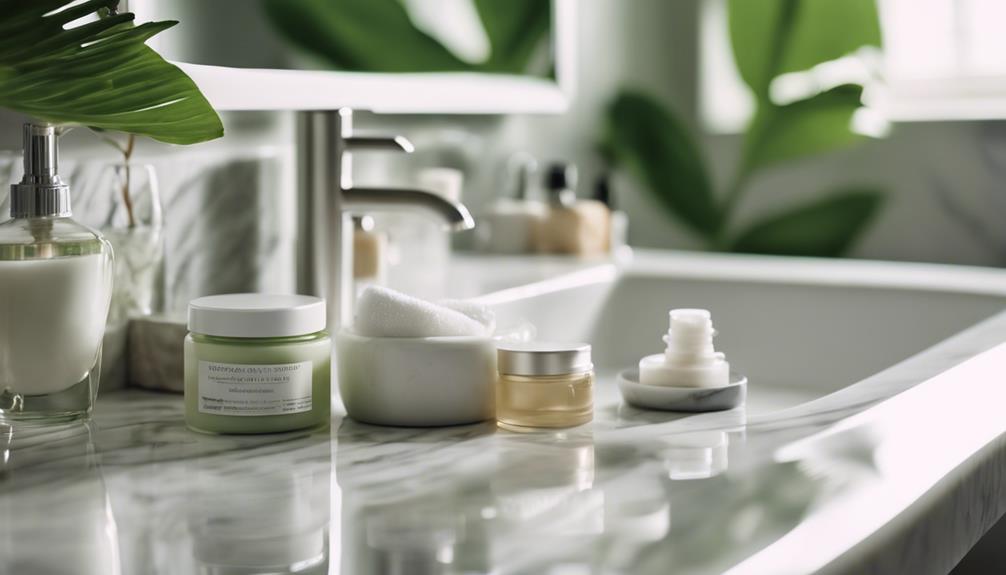
A complete skincare routine consists of six essential steps: cleansing, exfoliating, toning, treating, moisturizing, and applying sunscreen. Each step plays a significant role in maintaining healthy skin, and you'll want to follow them consistently for the best results.
Here's a quick overview of the steps to guide you:
- Cleansing: Remove dirt and impurities twice daily.
- Exfoliating: Slough off dead skin cells once or twice a week, based on your skin type.
- Toning: Restore pH balance and prepare your skin for further absorption.
Moisturizing hydrates your skin, while sunscreen protects it from harmful UV rays.
Remember, it's important to layer your products from the lightest to the heaviest for best absorption. When you stick to this routine, you'll see improvements in your skin's health over time.
Tailor each step to your unique skin type, and don't forget that consistency is key. With dedication, you'll achieve the glowing complexion you desire!
Cleansing Your Skin
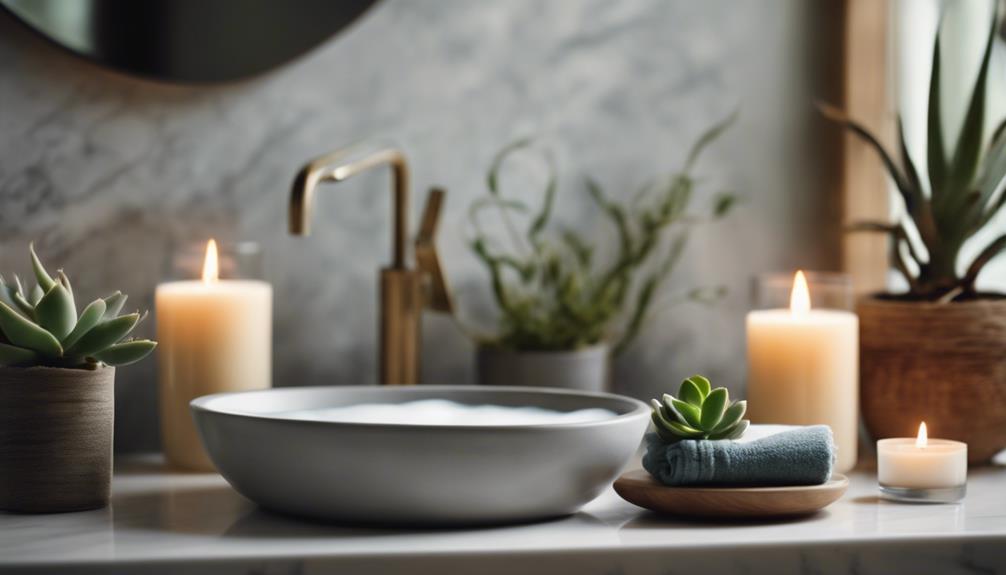
Cleansing your skin effectively is crucial for removing dirt, oil, and impurities that can lead to breakouts and dullness. To achieve ideal results, you should cleanse your face twice daily. Start by using lukewarm water to open your pores, then apply a gentle cleanser suited to your skin type. Massage the product into your skin using circular motions for better absorption.
Here's a quick guide to help you choose the right cleanser based on your skin type:
| Skin Type | Recommended Cleanser |
|---|---|
| Oily | Gel Cleanser |
| Dry | Cream Cleanser |
| Combination | Foaming Cleanser |
For those wearing makeup or sunscreen, consider double cleansing in the evening. First, use an oil-based cleanser to remove impurities, followed by a water-based cleanser to make sure your skin is truly clean. Don't forget to rinse thoroughly to remove all residue; leftover cleanser can irritate your skin or cause dryness. By following these steps, you'll keep your skin fresh and ready for the next phase of your skincare routine.
Exfoliation Techniques
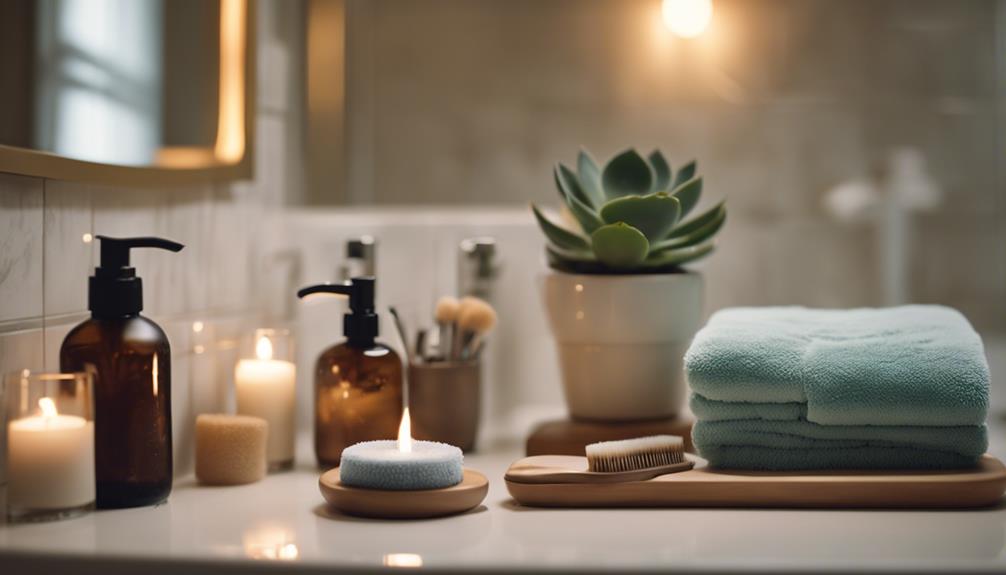
Exfoliation is a key step in your skincare routine that helps remove dead skin cells and improve texture.
You can choose between mechanical and chemical exfoliants, each offering unique benefits based on your skin type and concerns.
To achieve the best results, it's essential to apply the right technique and stick to the recommended frequency.
Types of Exfoliants
Two primary types of exfoliants—mechanical and chemical—offer distinct techniques for achieving smoother, more radiant skin. Understanding their differences can help you choose what suits your skin type best.
Mechanical exfoliants: These include physical scrubs or tools like brushes that manually remove dead skin cells.
Chemical exfoliants: These use alpha hydroxy acids (AHAs) or beta hydroxy acids (BHAs) to dissolve dead skin and promote cell turnover.
Frequency: Mechanical exfoliants should be used 1-2 times a week to avoid irritation, while chemical exfoliants can typically be used 2-3 times a week, depending on your skin's tolerance.
Post-exfoliation care: Always follow up with hydration and sun protection, as exfoliated skin can be more sensitive to UV damage.
Both types enhance skin texture, radiance, and help prevent clogged pores and breakouts. Choose the right exfoliant for your skin to enjoy the benefits without compromising its health.
Frequency Recommendations
Finding the right frequency for exfoliating your skin is essential to achieving a healthy, radiant complexion without causing irritation. Depending on your skin type, you'll want to tailor your exfoliation routine.
For sensitive skin, limit exfoliation to once a week to avoid irritation and maintain your skin barrier. If you have dry skin, you might also stick to once a week, using gentle exfoliants.
On the other hand, if you have oily skin, you can increase the frequency to up to three times a week. This helps control excess oil and can prevent breakouts. For most skin types, chemical exfoliants like AHAs and BHAs can be effective when used once or twice a week.
Be cautious with physical exfoliants; they may be too harsh for sensitive or dry skin, so limit those to once a week.
Always pay attention to how your skin responds after exfoliation. If you notice redness or increased sensitivity, you might need to scale back.
Remember to follow up with a hydrating product after exfoliating to replenish moisture and support your skin barrier.
Application Techniques
When you're ready to refresh your skin, consider whether mechanical or chemical exfoliation suits your needs best. Each method has its pros and cons, so think about your skin type and what works best for you.
Here are some key points to remember:
- Mechanical Exfoliation: Use gentle scrubs or tools once or twice a week.
- Chemical Exfoliation: Opt for AHAs or BHAs, typically 1-3 times a week based on skin tolerance.
- Patch Testing: Always perform a patch test to avoid adverse reactions, especially if you have sensitive skin.
Timing is essential; exfoliate in the evening to allow your skin to recover overnight and minimize sun sensitivity.
Whichever method you choose, be gentle and listen to your skin. Over-exfoliation can lead to irritation and damage, so find that sweet spot for your routine.
Toning for Balance
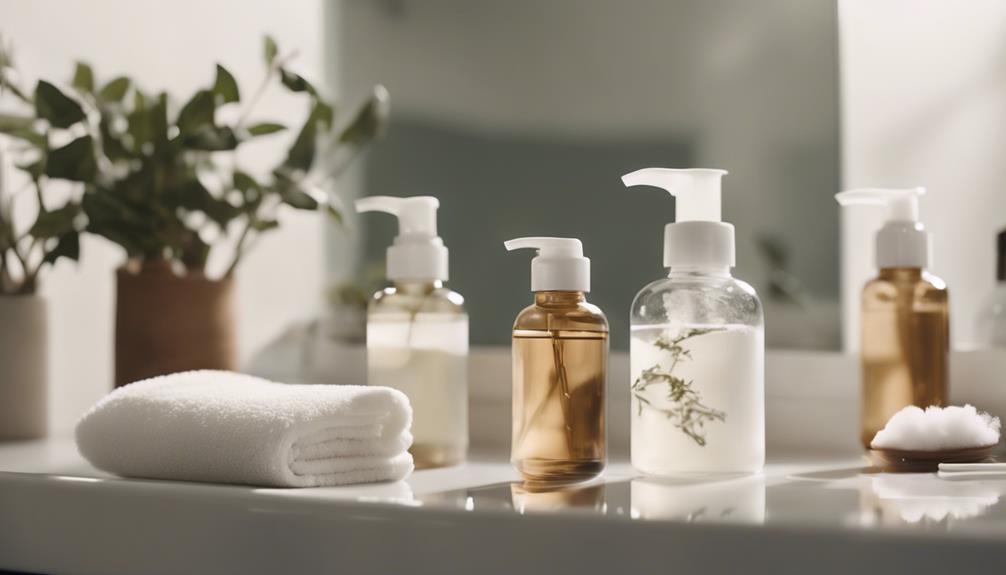
Toning balances your skin's pH after cleansing, making certain it's primed for better absorption of your skincare products. This step is essential because cleansing can disrupt your skin's natural acidity, leading to various issues. A good toner helps restore that balance while providing essential hydration.
When choosing a toner, look for alcohol-free options to avoid dryness and irritation, especially if you have sensitive or dry skin. Depending on your skin concerns, you can select a toner with specific ingredients. For example, if you struggle with oily skin, a toner containing glycolic acid can assist with gentle exfoliation, while soothing botanicals work wonders for sensitive types.
You can apply toner using a cotton pad or directly with your hands, but make sure to do this right after cleansing and before moving on to serums and moisturizers. This guarantees your skin is well-prepared to absorb the next steps in your skincare routine effectively.
Targeted Treatments With Serums
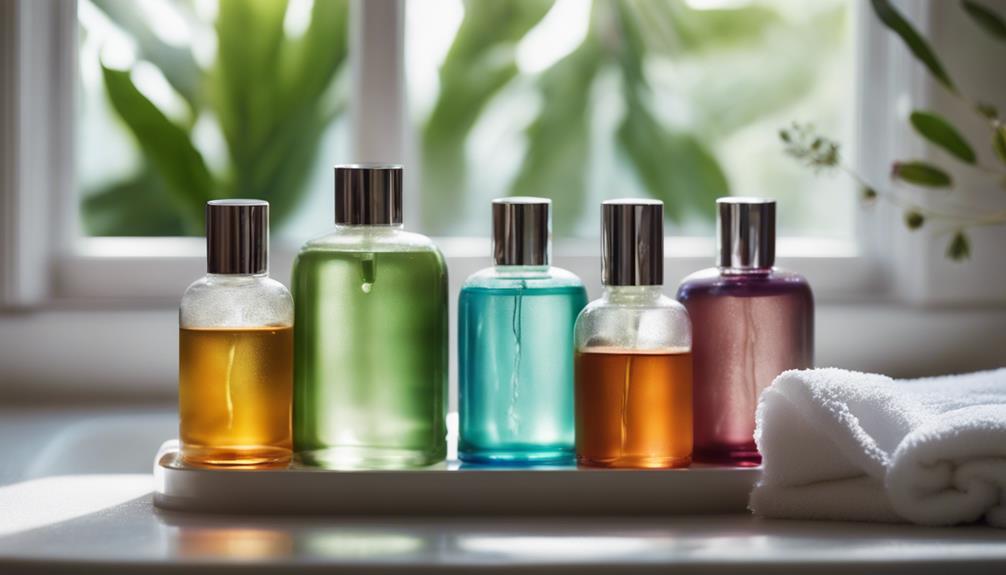
Serums deliver concentrated active ingredients that target specific skin concerns, making them a powerful addition to your skincare routine. Here's why you should consider incorporating serums:
- Targeted treatments for issues like acne, hyperpigmentation, and aging
- Active ingredients such as hyaluronic acid for hydration, vitamin C for brightening, and retinoids for minimizing fine lines
- Formulas tailored to your skin type—lightweight serums for oily skin and richer ones for dry skin
To maximize their effectiveness, apply serums after cleansing and toning. This allows the active ingredients to penetrate deeply and provide the benefits you seek.
Remember, choosing the right serum for your specific concerns is essential. For instance, if you're struggling with dryness, opt for a hydrating serum packed with hyaluronic acid. On the other hand, if your goal is to brighten your complexion, look for serums with vitamin C.
With the right choices and consistent application, you'll enhance your skincare routine and achieve noticeable results over time.
Moisturizing Effectively
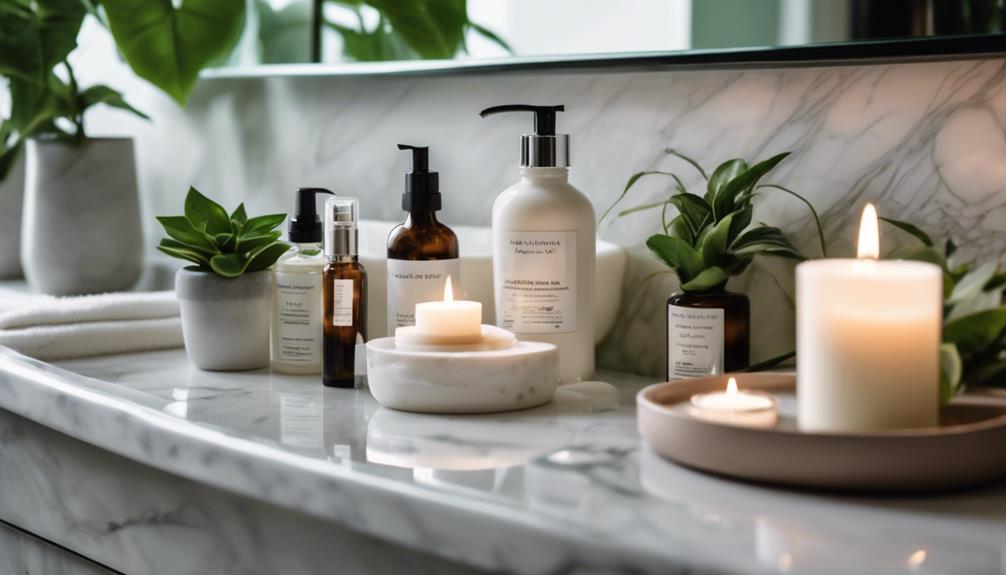
Moisturizing effectively is vital for maintaining healthy, hydrated skin and preventing dryness, regardless of your skin type. To achieve the best results, apply your moisturizer while your skin is still slightly damp. This technique enhances absorption and effectiveness, especially for products containing key ingredients like hyaluronic acid.
Choosing the right moisturizer for your specific skin type is essential. If you have oily skin, opt for lightweight formulations that won't clog your pores. For dry skin, cream-based products provide the necessary hydration, while gel-based options work well for combination skin. Always look for key ingredients such as ceramides, which help repair the skin barrier, glycerin for added hydration, and antioxidants to protect against environmental stressors.
Consistent use of your moisturizer—twice daily, once in the morning and once at night—can greatly improve your skin's texture and hydration levels over time. By committing to this simple yet effective step, you'll guarantee that your skin remains balanced and healthy, preventing dryness and promoting a radiant complexion.
Nighttime Routine Essentials
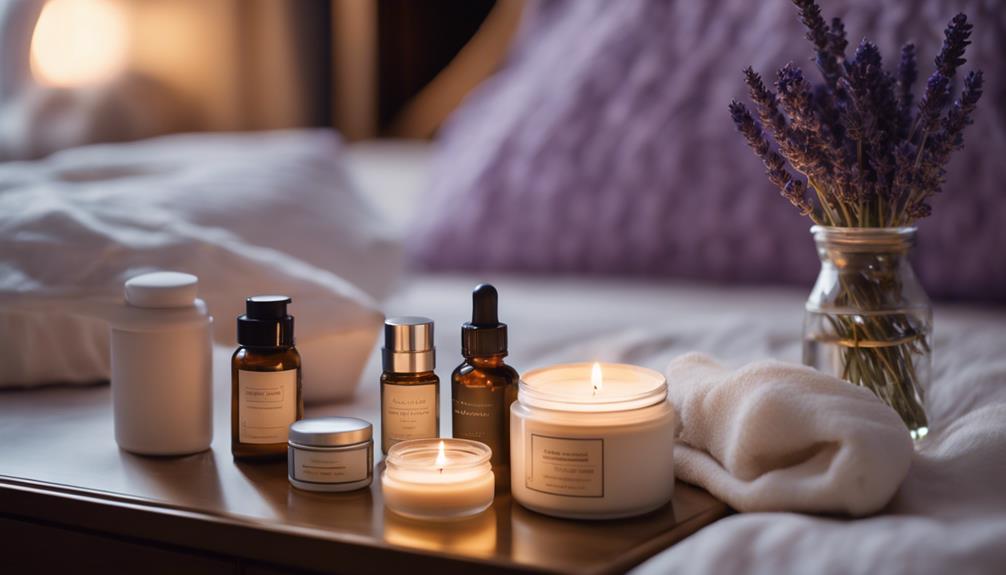
Taking care of your skin at night is essential for its health and appearance.
You'll want to choose the right products and apply them effectively to maximize their benefits.
Let's explore the importance of nighttime care, recommended products, and tips for getting the most out of your routine.
Importance of Nighttime Care
Focusing on nighttime care is essential for repairing and hydrating your skin while you sleep, ensuring it looks its best by morning. A well-structured nighttime skincare routine can make a significant difference in your skin's appearance and health. Here are some key benefits of establishing this routine:
- Effective cleansing: Remove impurities accumulated throughout the day.
- Targeted treatment: Utilize active ingredients to address specific skin concerns.
- Enhanced hydration: Incorporate moisturizers and serums for ideal moisture retention.
Your nighttime routine should always start with a thorough cleanse to eliminate dirt and makeup. This prepares your skin for better absorption of subsequent products.
After cleansing, consider adding a hydrating serum that targets your specific skin concerns, whether that's acne, aging, or dryness.
Follow up with richer moisturizers to lock in hydration overnight. The consistency of your nighttime routine is vital; sticking to it will yield significant improvements in your skin's texture and overall health.
Recommended Night Products
Finding the right night products is essential for achieving healthy, glowing skin by morning.
Start your nighttime routine with a gentle cleanser to remove makeup and impurities, followed by a hydrating toner that balances your skin's pH.
Next, focus on serums tailored to your specific needs. Look for serums with active ingredients like hyaluronic acid, which can boost hydration and support cell turnover while you sleep.
After applying your serum, it's time for a rich moisturizer or overnight mask. These products help lock in moisture and should contain ingredients like ceramides and peptides to strengthen your skin barrier.
If you have specific concerns, don't forget to incorporate targeted treatments. Eye creams are perfect for the delicate skin around your eyes, while spot treatments can effectively tackle acne.
Tips for Effective Application
To achieve the best results from your nighttime skincare routine, apply each product in the correct order and allow adequate time for absorption before moving on to the next step. Here's how to guarantee your skin reaps the full benefits:
Start with a thorough cleanse to remove makeup and impurities.
Use a toner tailored to your skin type for pH balance and hydration.
Apply targeted treatments like serums before your moisturizer.
Finish with a suitable moisturizer and eye cream for ideal hydration.
Begin by cleansing your face to create a clean canvas for your products.
Next, apply toner to help restore your skin's balance.
When it comes to targeted treatments, choose serums that cater to your specific concerns, whether that's anti-aging or acne.
After that, a rich moisturizer can lock in hydration and support skin repair while you sleep.
Don't forget to gently apply eye cream to the delicate area around your eyes to maintain hydration and minimize fine lines.
Following these essential care routine steps will help you achieve healthier, more radiant skin overnight.
Tips for Skincare Success
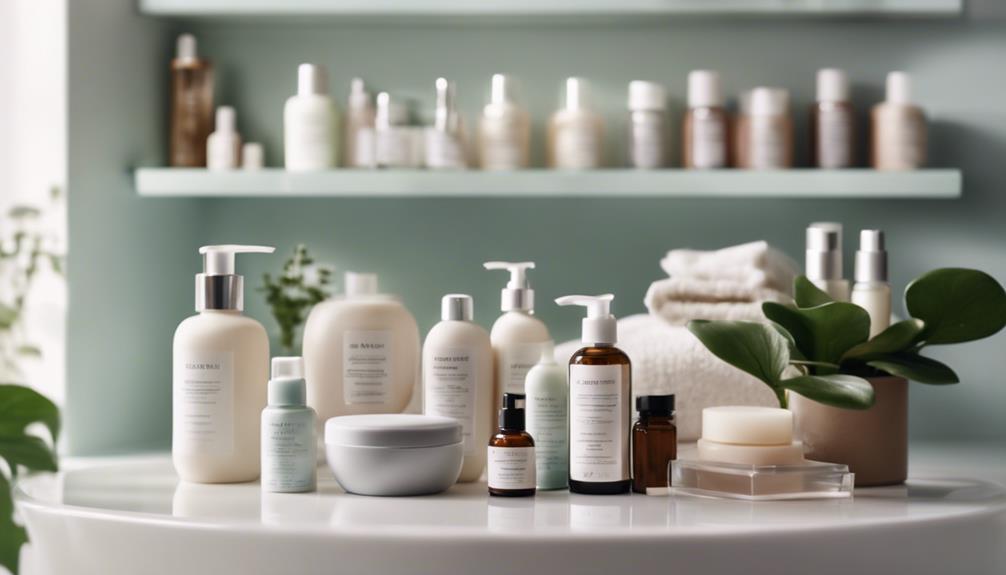
Creating a successful skincare routine hinges on consistency, so cleanse, tone, and moisturize twice daily for the best results.
It's important to use quality skincare products suited for your specific skin type. This approach not only supports the skin but also helps improve its overall appearance.
Be patient; allow at least six weeks of regular product use to see noticeable changes. Immediate results can be unrealistic, so stick with your routine.
As you monitor your skin's response, consider keeping a skincare journal. This will help you track product effectiveness and skin changes, allowing for informed adjustments.
Don't forget to adapt your routine seasonally or as your skin changes. For instance, during dry months, you might need a heavier moisturizer, while summer may call for lighter formulations.
Additionally, incorporate sunscreen into your morning routine. Protecting against UV damage is essential for preventing premature aging and maintaining skin health.
What Are the Best Skincare Routine Steps for Different Skin Types?
For proper skincare routine essentials tailored to different skin types, start with a gentle cleanser for dry skin, a salicylic acid cleanser for oily/acne-prone skin, and a mild exfoliant for combination skin. Follow with a hydrating serum for dry skin, a lightweight moisturizer for oily skin, and a multi-action moisturizer for combination skin.
Conclusion
Incorporating a skincare routine tailored to your skin type can transform your complexion.
Did you know that 60% of people don't follow a consistent skincare regimen?
Don't be part of that statistic! By understanding each step—cleansing, exfoliating, toning, treating, and moisturizing—you'll not only improve your skin health but also boost your confidence.
So, start today and watch your skin thrive with just a little daily effort!
Your journey to glowing skin awaits!
